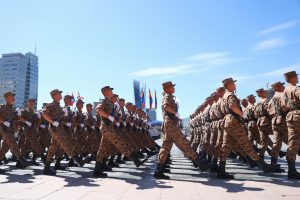“For the small nations,” reminded Czech-born writer Milan Kundera, “existence is not a self-evident certainty but always a question, a wager, a risk.” Nothing in recent memory reminded Mongolia of this vulnerability more than the war in Ukraine.
Surrounded by Russia and China, with a population of only 3.5 million, Mongolia is deriving many hard lessons from watching Ukraine. Such lessons learned by smaller countries will shape global affairs in the years to come.
Mongolia’s extreme geographic constraints mean that when it comes to foreign policy matters Ulaanbaatar usually has to first consider its two neighbors’ positions. But this approach inevitably delays Mongolia’s foreign policy formulation. In the age of social media, losing time means losing the narrative. Mongolia’s government has to learn to be proactive in its communication and stay ahead of the narrative. Otherwise, there is a risk of public opinion not accurately reflecting Mongolia’s foreign policy.
In the case of the war in Ukraine, Mongolian Minister of Foreign Affairs Battsetseg Batmunkh didn’t publicly communicate Mongolia’s call for a peaceful resolution of the conflict until March 2 – almost a week after the invasion. Even then, the message was not replicated in English.
Globally connected and socially conscious, Mongolian youth didn’t take the delay lightly. Mongolian social media is awash with criticisms of the government’s perceived inaction in advocating for Ukraine.
On the other hand, Mongolia had sent humanitarian assistance to Ukraine and did abstain from voting on a U.N. resolution demanding the withdrawal of Russian troops (rather than voting against the resolution). Although these measures are not enough by any means, they are significant considering the fact that Russia has almost total control of Mongolia’s energy supply and has been relentlessly pressuring Mongolia to support its war.
The communications shortcomings of the Mongolian foreign policy establishment are compounded by near absence of respected Mongolian voices in the international media. Except for one op-ed by then-prime minister in 2005 in The Washington Post, almost no Mongolian has published an op-ed in a major opinion-shaping publication, such as The New York Times or the Financial Times.
This is a serious gap that one can even argue has national security implications. Ukrainians are expertly deploying international media to inform the world about their plight. Mongolians are only now starting to realize the importance of being able to effectively make their case to an international audience.
Dwarfed by outsized military powers, Russia and China, for the past 30 years, Mongolia saw little need to spend much taxpayer money on its military. But the war in Ukraine is teaching Mongolians a different lesson: No one can predict the future, and Mongolia should be ready for any situation.
On July 10, State Flag Day, Mongolia’s government held probably the biggest annual military parade in 30 years. Judging by the enthusiasm and fanfare of the Mongolian public, there seems to be little resistance to this increased focus on military.
As noted by many international experts, a lot of Ukraine’s success can be attributed to their highly skilled and decentralized forces. Just like the Ukrainian military of 2014, Mongolia’s military still operates in the same old Soviet top-down culture.
But during the past eight years, Ukraine managed to empower their NCOs and gave more autonomy to small units. If the Mongolian army is serious about repelling external threats and internal instability, it has to undergo the same revamping of organizational culture. Given its limited size and resources, Mongolia has no choice but to rely on independent smaller units.
For various historical and geostrategic reasons, many Mongolians believe that Russia is the only country that could provide a security guarantee to Mongolia. But the Russian leadership’s recent unfounded claim that Mongolia hosts American bioweapons labs and Russia’s evident military shortcomings in Ukraine are making Mongolians question Russia’s desire and ability to guarantee stability in the region.
Mongolia is in the midst of figuring out its place in the changing world order. This process requires a delicate balancing act. On the one hand, as the only functioning democracy in the entire Eurasian heartland, Mongolians can deeply relate to Ukrainians’ desire to live in a democratic and prosperous society.
On the other hand, Mongolians are also realizing that should anything happen to Mongolia, the country will be on its own. No Western country could provide a security guarantee to Mongolia. Russia and China will not go away from the neighborhood, and one way or the other, Mongolia will have to peacefully coexist with them.
The lessons that smaller countries are deriving from the war in Ukraine are unique to their own circumstances. But the one unifying theme is increased self-reliance. Creatively circumventing constraints and making themselves indispensable to the global community are the key for small states. The war reminded Mongolians that they now have no choice but to prepare for all eventualities.

































